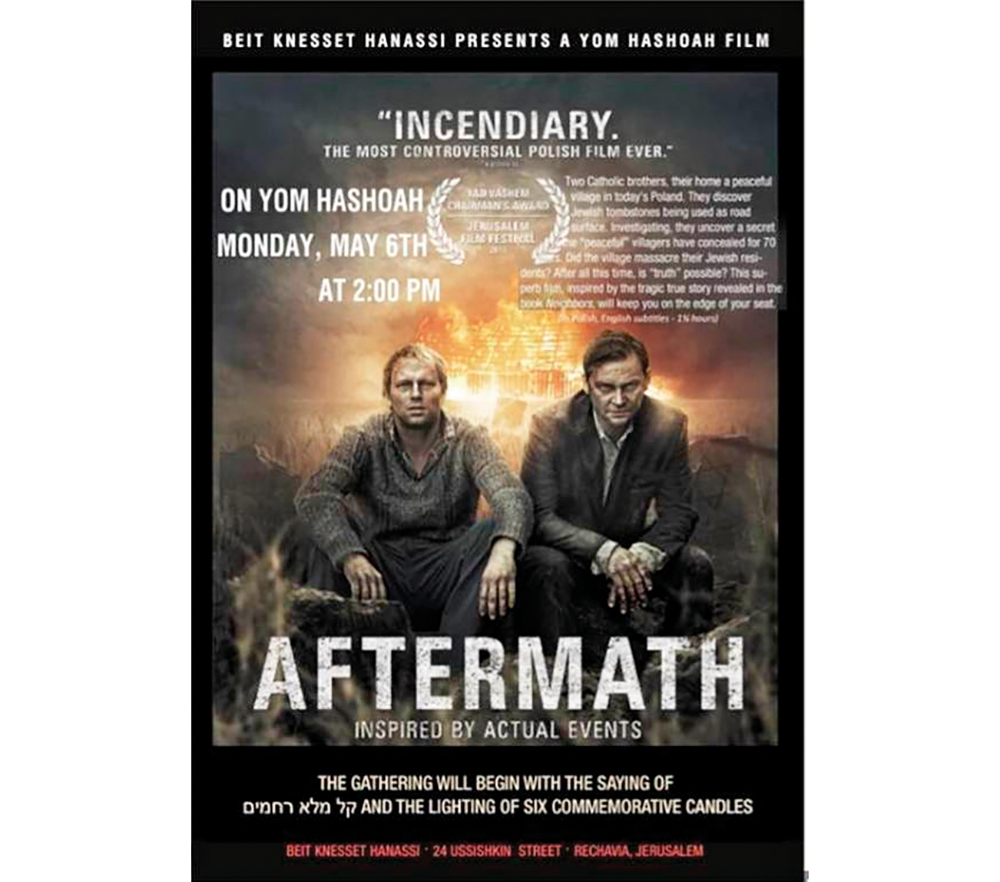
Beit Knesset Hanassi at 24 Rechov Ussishkin in Rechavia, Jerusalem, is host to a series of movies every three weeks catering to its Anglo population. Shirley Marks, British olah, serves as the president of the Women’s League and works together with retired American lawyer Mark Pollock in providing suitable films along with meaningful commentary. Pollack has also established an ongoing film program that takes place three days a week at the OU Center in the heart of Yerushalayim.
In marking Yom HaShoah at the Beit Knesset Hanassi, Marks and Pollock arranged for a showing of the “intense and haunting” 2012 Polish film “Aftermath,” based upon the historical study “Neighbors,” which sparked an explosive international reaction and backlash from right-wing Polish nationalists who still deny their ancestors’ complicity in the annihilation of Polish Jewry during the Holocaust.
In 2001, Dr. Jan Gross, Polish-American sociologist, historian and professor at Princeton University, published “Neighbors,” which created a “tsunami” in Poland and shocked people worldwide. According to his in-depth research, Gross revealed that on July 10, 1941, in the small Polish town of Jedwabne, the Christian citizens, comprising half of the town’s population, brutally murdered 1.600 Jewish men, women and children—the other half of the town’s populace—leaving only seven survivors. The Christian villagers forced their Jewish neighbors at gun and knife-point into an enclosed barn. They then set fire to the barn, shooting or stabbing any Jews attempting to escape. As the barn was engulfed in flames, the Polish villagers began plundering and occupying the Jewish homes and shops. After the fire, the villagers used axes to knock gold teeth from the bodies and in other ways violated the corpses. In his shocking account of the massacre, Gross reveals that Jedwabne’s Jews were murdered not by faceless Nazis but by people who had lived side by side as neighbors for generations.
After reading Gross’ revelatory historical account, filmmaker Wladyslaw Pasikowski wrote and directed the “Aftermath,” based upon the story of the Jedwabne pogrom, which left him “feeling angry and helpless.”
The film is a phenomenal and powerful drama. As its title suggests, it is about life in such a town after its Christians slaughtered its Jews and proceeded to appropriate their homes and businesses.
In “Aftermath,” the Kalina brothers, whose family had been residents of the town for many generations, discovered Jewish tombstones that were being used to pave roadways within the town. In an attempt to salvage the honor of these deceased Jewish residents, one brother digs up as many of the headstones that he can find and places them together in an open field where he washes them down to reveal their Hebrew inscriptions. In doing so, the brothers are threatening to reveal the secret that the “peaceful” villagers have been trying to conceal for over 70 years. Thus they become the target of verbal abuse and assault by the locals.
The film ends tragically with the revelation that the brothers’ own family had been active participants in the massacre of their neighbors.
The book and the film precipitated considerable antisemitism in the Polish media. The film was banned in some Polish towns. The rightwing and antisemites accused the film of being part of a Jewish conspiracy to tarnish Poland’s reputation. Marciej Stuhr, the actor who played the younger brother who saved the tombstones, received death threats while at the same time winning the Polish Film Academy Award for Best Actor. He was the butt of significant abuse and was even accused of being a “Yid.” In an article by a prominent Polish newspaper, he was accused of being a “walking symbol of simplifying and manipulating history for the sake of commercial success.”
Ironically, at the same time, large portions of the Polish population not only praised the film, but welcomed it. Poland’s cultural minister at the time lauded the film, which was eventually awarded the Best Picture of the Year by the Polish Film Academy. Yet, the powers that be still did not designate the movie as its national nomination for the Academy Awards Best Foreign Language Film Award, with the thinking that it is one thing to honor the film internally and something quite different to bring it international acclaim and attention!
As to the reactions in Poland to the revelations of the 2001 publication “Neighbors,” an entity created by the Polish Parliament began investigating the Jedwabne Massacre. After three years, the case was closed because no living perpetrators could be identified. However, after a review of the 1949 judicial proceedings and a new investigation by a special prosecutor, a conclusion was drawn. “While the crime was inspired by the Germans, it was the Polish population that executed the atrocity… The perpetrators of these crimes were the Polish inhabitants of Jedwabne and the surrounding area.”
Despite this conclusion, antisemitism in Poland has increased as a result of “Neighbors” and “Aftermath.” Many Poles still maintain that not a single Pole was involved in the Jedwabne butchery. However, there was another reaction. Not long after the government report confirming that Poles carried out the Jedwabne Massacre as well as many other similar ones, the plaque that claimed that the Nazis had killed the Jews was removed. A few months later, on the 60th anniversary of the pogrom, a ceremony was held at the site of the barn. The President of Poland participated in the nationally televised event and formally apologized for the Jedwabne Pogrom and others like it. A new inscription was placed upon the plaque which read, “In memory of the Jews of Jedwabne and surrounding areas, men, women and children, fellow dwellers of this land, murdered and burned alive at this site on 10 July 1941.”









